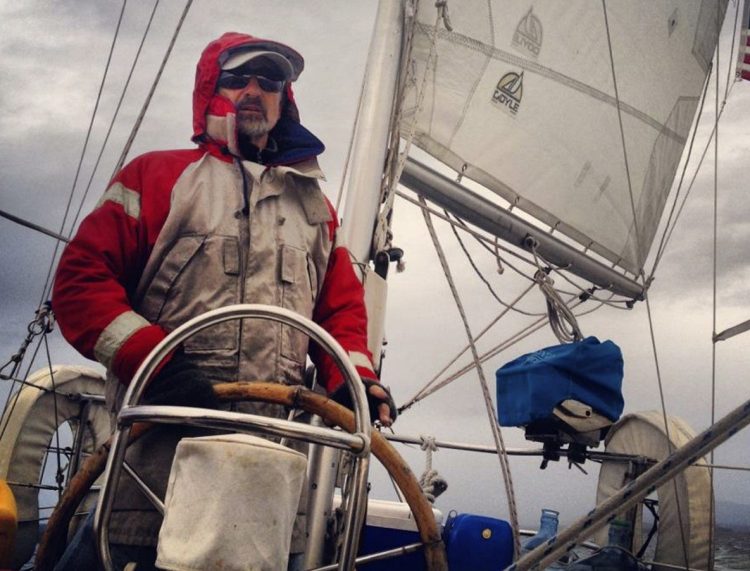The Camden charter boat captain who is charged with seaman’s manslaughter in the death of a crew member is asking a federal judge in the U.S. Virgin Islands to allow him to have an expert witness testify remotely during his trial.
Richard Smith is scheduled to go on trial in U.S. District Court in St. Thomas on Monday.
Smith’s attorney, David Cattie, filed a motion Thursday asking Magistrate Judge Ruth Miller to reconsider her denial of a request for marine expert and consultant Capt. Stephen Richter to testify remotely from the federal court in Philadelphia.
The court had denied the motion, saying it had concerns about the possibility of connectivity problems using a video feed. Cattie argued that he has used a video feed to participate in court proceedings on several occasions.
“The defense in this case is facing the prospect of not having a critical witness testify because Mr. Smith is too poor to pay the costs of having the witness appear live,” the motion says.
The government’s prosecution of Smith has rendered him “functionally destitute,” Cattie said.
The cost for Richter to travel to the Virgin Islands and testify has been estimated at $12,000.
Richter is a marine and navigation consultant, master captain, and expert witness in legal cases, according his website. He is expected to testify that Smith’s actions after crew member David Pontious jumped overboard on Oct. 25, 2015, 400 miles off Cape Fear, North Carolina, were not negligent.
A federal grand jury in the Virgin Islands indicted Smith in July on a charge of seaman’s manslaughter. The indictment was sealed, and Smith was arrested on Nov. 2 after arriving in the Virgin Islands, where he operates his charter business during the winter. He has been free on bond since then, but is prohibited from sailing or leaving the island.
Cimarron, Smith’s 43-foot yawl, was on its way from Maine to the Virgin Islands in October 2015, according to paperwork filed by the U.S. Attorney’s Office. One crew member had to leave the vessel and Pontious became part of the four-member crew at Beaufort, North Carolina, on Oct. 21.
The indictment alleges that Smith, as captain and owner of the Cimarron, engaged in misconduct, negligence and inattention to duty that led to the death of Pontious.
A Coast Guard report says the captain and other crew members had never met Pontious before he joined the crew. Soon after the boat left Beaufort, Pontious became extremely seasick, court documents say.
Over the next few days, Pontious became dehydrated and disoriented and started experiencing hallucinations. He was on anti-depressant medication, but his constant vomiting reduced the medication’s effectiveness.
Early on Oct. 25, Pontious became aggressive, according to a Coast Guard summary filed in federal court. Pontious, who was 6 feet tall and weighed 250 pounds, attacked the captain, punching him twice and trying to strangle him, the summary says. He also tried to steer the vessel to a “door” that did not exist.
Pontious eventually climbed over a wire railing and jumped overboard. Smith watched him sink into the water, with a trail of bubbles visible under the nearly full moon The captain ordered another crew member to shine the spotlight to see if he could locate Pontious.
When he could not be found, Smith allegedly said, “There is nothing we can do,” and continued sailing. He tried contacting other vessels, but without success.
The indictment asserts that the captain should have activated his emergency position-indicating radio beacon, which would have immediately alerted the Coast Guard. He also failed to properly use his VHF marine radio, and also failed to deploy a search-and-recover pattern, according to the indictment.
The prosecution notified the court on Dec. 14 that it plans to present two expert witnesses who will testify that Smith should have acted sooner to help Pontious when he became ill and should have done more when he jumped overboard.
The Coast Guard investigator, however, said the captain and crew acted appropriately.
“Nobody on this vessel was trained for this sort of situation, and I believe they tried to handle it as best they could without (communcations), and being so far from shore for assistance,” Coast Guard Lt. Jacob Hopper said in his report.
“Once David jumped off the vessel and the Captain saw him sink into the water and not come back up, he was relieved, because at this point David was not a threat to the crew,” Hopper’s report says. “Hindsight is 20/20 and when not placed in a situation like that, one may ask why didn’t you search? Why didn’t you throw a life ring and an EPIRB out? The Captain saw him go under and not resurface, and that is why he did not turn back and search, plus he was scared to death that if (Pontious) got back on the vessel, he would throw other people overboard.
“I asked the Captain face to face about why he did not throw the EPIRB out with a life ring, and he told me that he never even thought about that with all the fear and terror that was going through his mind.”
Comments are not available on this story.
Send questions/comments to the editors.


